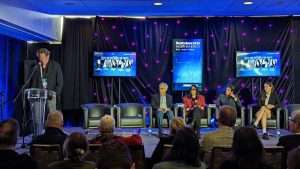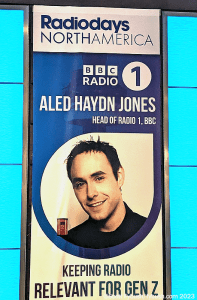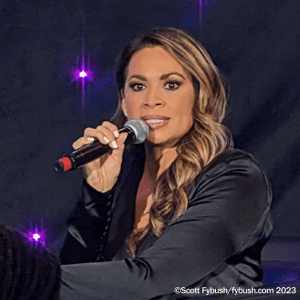NorthEast Radio Watch 12/8/2025: Cichon’s Back in Buffalo
In this week’s issue… Veteran newsman returns - Remembering NY's Leitner, RI's Jones - CT AM saved - Maine AM moves - "Indie" adds suburban signals
It’s not easy to launch a new broadcast conference, especially these days. Travel budgets are tight, fewer local stations have the autonomy to send people without corporate approval – and when there’s an international border involved, it gets even harder.
So it wasn’t a big surprise to arrive at the new RadioDays North America convention in Toronto last week to find that there weren’t very many US broadcasters among a crowd that was predominantly Canadian. That’s too bad, because those of us who did head for the great (and rather smoky) North were rewarded with a conference that was more forward-looking and upbeat than most of the get-togethers we’ve been attending in the last few years.
 The new North American edition of RadioDays is a mashup of two existing conferences: the long-running RadioDays Europe and RadioDays Asia international gatherings that focus on programming, promotions and the digital future, paired with the equally long-running Canadian Music Week that, as you’d expect, is all about Canadian musicians and promoters. In the last few years, CMW has included a small radio-centric track of sessions, but the pairing with RadioDays was intended to broaden its outreach, which it very much did.
The new North American edition of RadioDays is a mashup of two existing conferences: the long-running RadioDays Europe and RadioDays Asia international gatherings that focus on programming, promotions and the digital future, paired with the equally long-running Canadian Music Week that, as you’d expect, is all about Canadian musicians and promoters. In the last few years, CMW has included a small radio-centric track of sessions, but the pairing with RadioDays was intended to broaden its outreach, which it very much did.
Those who attended were treated to two full days of in-depth sessions, usually two at a time in conference rooms separated by a small but busy exhibit hall split between radio vendors (automation systems, music scheduling, text messaging and more) and vendors looking for music clients (want custom-printed T-shirts?)
Yes, the conference kicked off with the inevitable discussion these days about the use of AI, with Futuri’s Daniel Anstandig delivering an opening keynote about how his company is working to enable broadcasters to use computer-generated voices in place of actual human broadcasters. It was a timely talk, coming as it did just days before one such broadcaster, Alpha in Portland, Oregon, began a trial of a Futuri-generated “AI Ashley” based on one of its own human jocks.
 Will more broadcasters try out the technology? Very possibly – but so much more of this convention was all about how other broadcasters can take advantage of authentic human connections to better serve their listeners.
Will more broadcasters try out the technology? Very possibly – but so much more of this convention was all about how other broadcasters can take advantage of authentic human connections to better serve their listeners.
Take, for example, the BBC’s Radio 1.
As network head Aled Haydn Jones told a full room, Radio 1’s mandate to continue to serve young listeners means that these days, its programming is focused on Gen Z, an audience it superserves with live artist appearances, fun contests to engage listeners, and a constant stream of new on-air talent that the network works hard to cultivate.
Hear from Aled Haydn Jones and other RDNA participants on this week’s Top of the Tower podcast from Fybush Media, with more content from the convention in upcoming episodes…
Can the magic of Radio 1 happen on a North American budget? Haydn Jones fielded those questions (as with every session, there were plenty of opportunities for audience engagement), admitting that the BBC has structural and budget advantages most of us would envy. There were plenty of more realistic ideas for Canadian and US broadcasters to draw from, too: Tom Power, host of the CBC’s “Q,” shared his story about how the interview show reinvented itself in a stripped-down, podcast-first form after the controversy surrounding former host Jian Ghomeshi almost took it off the air, for instance. As with the European RadioDays, there was plenty of talk about podcasting and bringing more diverse voices to the microphone.
 It was especially refreshing to have many younger faces and voices on the stage. iHeart’s Carolina Bermudez talked about her success story on mornings at New York’s WKTU. Shannon Burns, who just turned 30 and is already heard in middays across Canada on Bell’s “Virgin” top-40 stations, was part of a Friday panel on “Radio: Can You Handle the Truth?”
It was especially refreshing to have many younger faces and voices on the stage. iHeart’s Carolina Bermudez talked about her success story on mornings at New York’s WKTU. Shannon Burns, who just turned 30 and is already heard in middays across Canada on Bell’s “Virgin” top-40 stations, was part of a Friday panel on “Radio: Can You Handle the Truth?”
And Jamar McNeill (the former “JNiice” of WPGC in Washington), who co-hosts mornings on Toronto’s CHUM-FM, proved an engaging and probing interviewer as he questioned iHeart chief programming officer Tom Poleman. We’d have loved to have heard Poleman go up against Anstandig about AI; for his part, Poleman is no fan, pointing out that an AI jock can’t do the sort of human endorsements that are a big revenue generator for his stations.
There were plenty more panels that we simply couldn’t get to amidst two days of jam-packed programming (not to mention socializing – we made so many connections with interesting Canadian broadcasters during the show!) If you were looking for the latest on the connected dashboard in cars, strategies for programming to PPM audiences, or plenty of detailed new research from groups such as Edison and Coleman, you were in the right place, too.
Bottom line? At least in its current form, with plans to return to Toronto next June, RadioDays North America still isn’t meant to be a convention for everyone. If you’re looking for specific topics in broadcast engineering, sales or top-level management, there are probably more specific conferences on this side of the border that will fill your needs better. But if you’re a programmer (especially in music formats), if you’re in station promotions, or if you’re an air talent or a podcaster in search of inspiration and solid new ideas, you’d be well advised to get your passport updated and make plans to be in Canada a year from now. We’ll see you there!
In this week’s issue… Veteran newsman returns - Remembering NY's Leitner, RI's Jones - CT AM saved - Maine AM moves - "Indie" adds suburban signals
In this week’s issue… Scripps stations face takeover - Sinclair moves more affiliations - CT stations sold - Maine AM surrendered - Remembering WVBR's Shapiro, WABC's Morgan
In this week’s issue… CT TV legend succumbs to cancer - Remembering PA's Adams - FCC still stalled by shutdown - Pittsburgh morning host exits
In this week’s issue… FCC faces reopening challenges - Veteran Boston anchor retires - Morning shift in Toronto - NYC FMs expand reach